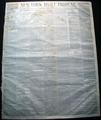Home >
Daniel Webster’s historically pivotal speech...
Daniel Webster’s historically pivotal speech...
Item # 715697
March 08, 1850
NEW YORK DAILY TRIBUNE, March 8, 1850
Page 2 has the single-column heading, "MR. WEBSTER'S SPEECH", which is a lengthy report containing excerpts and paraphrases of his pivotal, historic, "March 7th Speech" before Congress. It includes in part: "He rose, he said, not as a Southern Man, not as a Northern Man, but as an American, and desired to do his duty with fidelity, with the hope that the storm which is now raging over the land might be allayed. He spoke for the preservation of the Union with an anxious heart - for the restoration of that quiet and harmony so necessary to the prosperity and happiness of the country...", followed by considerable details of the speech.
Other news of the day and period advertising are found throughout.
Complete in 4 pages, minor foxing, slightly loose left spin, nice condition.
AI notes: In his renowned Seventh of March Speech delivered in 1850, Senator Daniel Webster made a powerful and controversial appeal for national unity in the face of growing sectional tensions over slavery. Speaking as an "American" rather than a representative of the North, Webster implored both Northern abolitionists and Southern secessionists to seek compromise rather than conflict, supporting Senator Henry Clay’s proposed Compromise of 1850 as a necessary measure to preserve the Union. He warned that secession would lead to civil war, emphasizing that no peaceable disunion was possible and that the Constitution must be upheld in its entirety, including the Fugitive Slave Clause, which required the return of escaped enslaved people. While his call for mutual concessions was rooted in a desire to protect the Union and prevent bloodshed, Webster’s endorsement of enforcing the Fugitive Slave Act drew sharp criticism from anti-slavery Northerners, many of whom viewed it as a betrayal of moral principles. Despite the backlash, Webster’s speech played a key role in facilitating the passage of the Compromise and temporarily delaying the Civil War, underscoring his belief that preserving the Union was paramount, even at the cost of painful concessions.
* Abolitionist-leaning Daniel Webster
* His historic call for unity before Congress
* His historic call for unity before Congress
* He shockingly (?) supports the "Compromise of 1850"
Page 2 has the single-column heading, "MR. WEBSTER'S SPEECH", which is a lengthy report containing excerpts and paraphrases of his pivotal, historic, "March 7th Speech" before Congress. It includes in part: "He rose, he said, not as a Southern Man, not as a Northern Man, but as an American, and desired to do his duty with fidelity, with the hope that the storm which is now raging over the land might be allayed. He spoke for the preservation of the Union with an anxious heart - for the restoration of that quiet and harmony so necessary to the prosperity and happiness of the country...", followed by considerable details of the speech.
Other news of the day and period advertising are found throughout.
Complete in 4 pages, minor foxing, slightly loose left spin, nice condition.
AI notes: In his renowned Seventh of March Speech delivered in 1850, Senator Daniel Webster made a powerful and controversial appeal for national unity in the face of growing sectional tensions over slavery. Speaking as an "American" rather than a representative of the North, Webster implored both Northern abolitionists and Southern secessionists to seek compromise rather than conflict, supporting Senator Henry Clay’s proposed Compromise of 1850 as a necessary measure to preserve the Union. He warned that secession would lead to civil war, emphasizing that no peaceable disunion was possible and that the Constitution must be upheld in its entirety, including the Fugitive Slave Clause, which required the return of escaped enslaved people. While his call for mutual concessions was rooted in a desire to protect the Union and prevent bloodshed, Webster’s endorsement of enforcing the Fugitive Slave Act drew sharp criticism from anti-slavery Northerners, many of whom viewed it as a betrayal of moral principles. Despite the backlash, Webster’s speech played a key role in facilitating the passage of the Compromise and temporarily delaying the Civil War, underscoring his belief that preserving the Union was paramount, even at the cost of painful concessions.
Category: Pre-Civil War
























